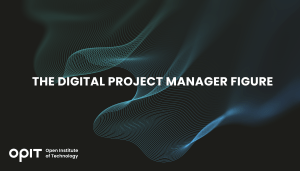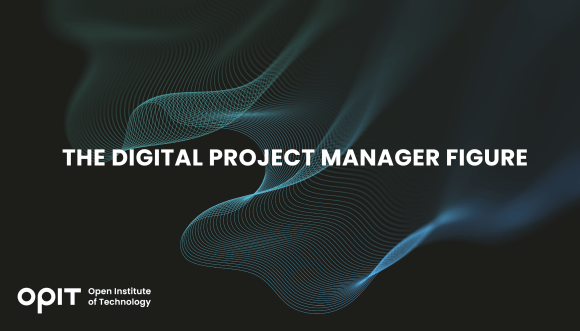

Project managers face the unique challenge of bringing multiple aspects of a job together, from personnel to assets. Digital project management requires the same skills but over many more streams of data and work. As a digital project manager, you might have to handle DevOps teams, data integration, and a wealth of online marketing information. Digital transformation means the opportunities for digital project managers are increasing — if you have the right skills and qualifications.
OPIT’s BSc and MSc courses provide the right foundation for building your digital project management career. Let’s take a look at what you can expect from this career choice and the best pathways to success.
The Role of a Digital Project Manager
What does a digital project manager do? Their roles and responsibilities vary depending on the industry they’re in. For example, a project manager in a game development company will have different workflows to manage than their counterpart in manufacturing. However, many duties remain common.
Digital project managers ensure every member of the team is delegated the right task and knows exactly what to do. Typically, they’ll use project management software, including collaboration tools and time management solutions. These software platforms may also empower project managers to divide larger projects into smaller tasks and assign assets to each task appropriately.
Another key responsibility of project managers is to monitor the timeline of projects. They’ll have to consider how long tasks should take and how that impacts overall completion. This involves setting and tracking deadlines, plus dealing with obstacles such as absenteeism, technical glitches, or client requests. Since this requires a great deal of inter-team and intrateam collaboration, digital project managers must have excellent leadership skills.
Digitally focused professionals are most likely to find work in:
- Digital marketing or advertising
- Enterprise software implementation
- Digital transformation projects
- Web or mobile app development
- SaaS (software as a service) development
As these factors are now embedded across multiple industries, digital project managers could find work in multiple fields. For example, many healthcare facilities are upgrading their patient data management systems to digital alternatives. Statistics show that globally, healthcare organizations are spending $1.3 trillion on digital transformation — a figure that’s continuing to grow. Digital project managers could find work helping implement electronic health records (EHR) and ensuring the smooth rollout of associated processes.
Digital Project Manager: A Typical Day
A digital project manager or PM will have their own daily routine:
- Start the day with a quick update from all team members — you might do this face-to-face or give a time slot for people to drop their updates in virtually. You’ll ensure all remote team members and contractors/freelancers are included.
- Check what tasks need to be completed today/this week and that you have all the required assets and personnel available. You might have to liaise with other teams or gain sign-off from change management professionals.
- Ensure someone has updated the client on the current progress of the project. You may have digital project management tools that provide automatic updates.
- Deal with obstacles and challenges as required. Listen to team members and ensure you remove as much friction from processes as possible. You may have to facilitate meetings between different areas of the business, or clients and project team leaders.
- Prioritize deliverables. As the digital PM, you get to decide what gets done first. Just remember to document the reasons. The board, client, or other stakeholders may need this data at some point.
- Utilize data from multiple streams to aid with prioritization and delegation. Digital project management requires knowledge of the skills and experience of team members. You must be able to share work fairly to avoid overburdening employees while considering their strengths.
- Resource management: you may have to liaise with HR, finance, or the client regarding allocating budgets and gaining relevant personnel and assets.
- Each day will also involve careful documentation of progress. Project managers are responsible for providing clear digital communication channels for all project stakeholders.
There may also be industry-specific daily responsibilities. To go back to the healthcare example, ensuring the security of data as per HIPAA requirements might fall under the scope of project management.
Skills Required for Digital Project Management
Whatever industry they work in, all digital project managers require the following skills:
- Technical knowledge of various systems, apps, and software
- Data analysis and pattern recognition
- Data visualization
- Excellent communication
- Problem-solving
- Leadership
- Mediation
- Time management
Project managers must be able to make tough calls. They’ll need to pivot when strategies aren’t working or reallocate team members at a moment’s notice.
OPIT’s courses help prepare prospective project managers for their role by nurturing these skills. The BSc and MSc courses in Digital Business both include segments on organizational behavior, project management, and quality analysis. By gaining both theory and hands-on practical work on these topics, students get the preparation they need for these demanding roles.
Career Path for Digital Project Managers
There are many paths to becoming a digital project manager, but they all require education and experience. As the PM has so much responsibility, most enterprises require applicants to have a BSc degree at the minimum. However, employers know that education only paints part of the picture. You might follow these steps to gain success in digital project management:
- Gain your qualification through an accredited education provider like OPIT.
- Seek internships to gain experience.
- Network and create contacts via conferences, webinars, and industry events.
- Research where opportunities exist and apply for roles that match your skills and career ambitions.
- Keep a document of everything you do and update your CV regularly.
Digital project managers are highly sought after in various sectors. Software developers with DevOps and DevSecOps teams often seek digital PMs to manage increasingly distributed systems and teams. Businesses looking to update their cybersecurity policy may hire project managers to ensure this gets done in a timely and efficient manner. Also, look for opportunities in industries undergoing dramatic digital transformation efforts. You might consider healthcare, finance, real estate, or agriculture. Sustainable digitalization is a hot topic in farming right now across Europe. Digital project managers passionate about environmental concerns might find job satisfaction in this industry.
Salaries for digital project managers range from €76K to €137K ($83K to $150K).
Your OPIT course can help open many career doors. We encourage internships and provide elective additional units that may align with your career goals. We also have a dedicated career services team to support students in realizing their dreams.
Challenges in Digital Project Management
A key aspect of gaining success in digital project management is recognizing and handling challenges:
- Managing increasingly remote and disparate teams.
- Providing team members with continuous education on rapidly evolving emerging technologies.
- Scope creep — where client change requests cause project parameters to veer outside the originally agreed scope.
Digital project managers need excellent communication skills and the confidence to approach these challenges head-on. To prevent scope creep, for example, digital PMs must be able to say “No,” to clients. They have to set reasonable expectations while giving unwanted answers a positive spin. Alternatively, they may build a sliding cost into a project allowing clients to request more on a pay-as-you-go basis.
OPIT’s curriculum is highly focused on producing similar practical solutions. Every course involves getting hands-on so students are always trying out new things and learning what works in each situation.
OPIT’s Bachelor’s and Master’s in Digital Business
What can you expect as a learner on an OPIT course? The Bachelor’s Degree in Digital Business covers business fundamentals, project management, business strategy, and much more. It’s aimed at undergraduates looking to combine digital fluency with business acumen. This course costs €2,250 per term and is fully remote.
For graduates looking to learn advanced skills and further their careers, the Master’s Degree in Applied Digital Business is the next natural step. This course dives further into digital project management and digital transformation. Students learn about the interplay between digitalization and business, and are highly encouraged to pursue an internship with a trusted industry partner. The cost for this course is €6,750 and dedicated students can complete a fast-track option in just 12 months.
On all OPIT courses, you gain access to high-level academics and excellent student support. Our courses combine strong technical skills with the digital business know-how you need to hasten your journey along your chosen career trajectory.
Digital Project Managers are Vital for Business Success
As a digital project manager, you could be the difference between an organization surviving or thriving in its market. You’ll need excellent communication and leadership skills, bolstered by the technical knowledge and experience that comes from the right educational pathway.
If you’re excited to pursue a career in digital project management, take a look at OPIT’s course offerings. Our goal is to help you succeed, so get in touch if you need more information.
Have questions?
Visit our FAQ page or get in touch with us!
Write us at +39 335 576 0263
Get in touch at hello@opit.com
Talk to one of our Study Advisors
We are international
We can speak in:




